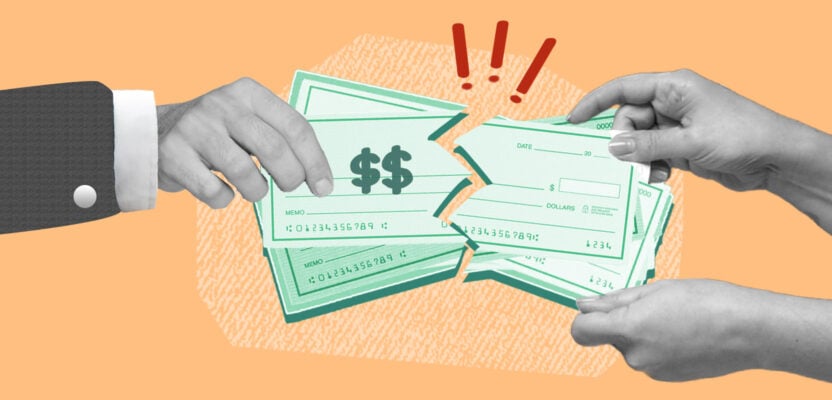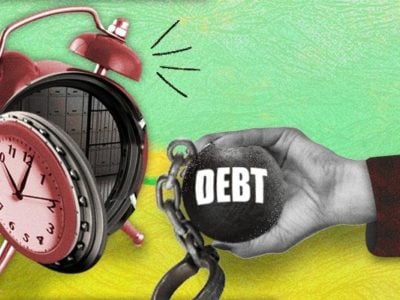Having a debt sent to collections is stressful, and it can be tempting to just ignore the problem in the hope that it will go away. Unfortunately, ignoring your debt collector is dangerous. They may resort to suing you if they think there’s no other way to make you pay, and if they win, they could be awarded a court judgment allowing them to take money from you by garnishing your wages.
The good news is that there are steps you can take to prevent this. Whether you’re being sued by debt collectors or you’ve just noticed a new collection account on your credit report, it’s important to know your rights and what you can do to keep debt collectors from garnishing your wages.
Table of Contents
Can a debt collector garnish your wages or bank account?
Yes, debt collectors and creditors can garnish (take money from) your wages or bank account under certain circumstances. They can continue to do so until all of your debt is repaid.
For most types of debts, the debt collection agency or creditor (such as a credit card company) managing your account has to file a lawsuit against you before they have the right to garnish your wages. If you miss your court hearing or lose the case, the court may enter a judgment against you allowing your debt collector to do the following things: 1
- Garnish your wages
- Freeze or garnish money from your bank account
- Put a property lien (a legal claim) on your belongings
Note that some states protect bank accounts from creditors in various ways. Make sure you understand your rights so that you know if a creditor has violated the law.
Debts that can be garnished without a lawsuit
For certain debts owed to the government (such as unpaid taxes or federal student loan collections), debt collectors can skip the legal process and garnish your wages or savings without court approval. 2
Debts owed to private companies, such as banks, hospitals, and utility companies, can never be garnished without a lawsuit.
Some states have a “head of household” exemption law for wage garnishment
Some states have a head of household exemption that applies to unmarried individuals who have a financial dependent in their household. 3 However, the exemption status typically won’t be granted to you automatically, so you’ll have to file paperwork with the court to claim it.
Can a debt collector or creditor garnish my stimulus check?
Yes, your debt collector or creditor may be able to garnish your stimulus check, depending on which state you reside in.
The stimulus payments issued during the COVID-19 pandemic under the federal government’s Coronavirus Aid, Relief, and Economic Security (CARES) Act aren’t explicitly protected from being garnished for delinquent unpaid debts. 4
However, some states, including New York, Massachusetts, and Nebraska, have made exemptions or imposed restrictions on the garnishment of stimulus checks by debt collectors. 5 6 7
If a debt collector has garnished your stimulus check, make sure to check your state’s laws to see if they’ve violated your rights. If you’re unsure, then it might also be worth speaking to an attorney.
Can a debt collector garnish my federal benefits?
No, in most cases, debt collectors can’t garnish your federal benefits. Federal law prevents the garnishment of benefits awarded under the following schemes and programs: 8
- Social Security
- Supplemental Security Income (SSI)
- Veteran schemes
- Federal railroad retirement
- Unemployment and sickness
- Civil service retirement
- Federal employee retirement
Fight back against anyone attempting to garnish your federal benefits—doing so is always illegal.
Your employer can’t fire you over wage garnishment for a single debt
Your employer may know about your debts if your wages are being garnished since they’ll need to deduct money from your paycheck. However, the Consumer Credit Protection Act (CCPA) prohibits your employer from firing you if your wages are being garnished for just a single debt. However, that protection doesn’t apply if your wages are being garnished for more than one debt. 9
Debt collectors and creditors who don’t need to sue you before garnishing your wages
As stated, for most types of debts, debt collectors and creditors can’t just garnish your wages once you stop making payments. They have to file a lawsuit against you and obtain a judgment first. However, there are certain debts that the law considers important enough for debt collectors and creditors to skip the trial process before garnishing your wages.
The following debts have rules that accelerate the collection process: 9 10
- Unpaid taxes
- Child support and alimony
- Federal student loans
How much of my wages can be garnished?
The Consumer Credit Protection Act (CCPA) limits how much of your disposable income can be taken by debt collectors and creditors. 9 (Your disposable income is however much of your earnings you have left after taxes and other legally required deductions.)
The CCPA is a federal law, so it applies in the entire country. Some states also have stricter laws that protect more of your income.
If your state’s wage garnishment laws conflict with the CCPA, debt collectors and creditors must conform to the law that protects you more, i.e., that results in the lower amount of your income being garnished. 9 Under no circumstances can debt collectors garnish more than the amount specified in the CCPA.
The table below shows how much of your wages can be garnished for different types of debt: 9 11 12
Wage garnishment by debt type
| Type of debt | Maximum percentage of your income that can be garnished |
|---|---|
| Debts pursued under a court judgment, such as: ● Credit card debt ● Medical bills ● Most other consumer debts | The lesser of the following: ● 25% of your weekly disposable earnings ● The amount you earn beyond 30 times the federal minimum wage (currently $7.25/hour) Example: Say your weekly disposable income after necessary deductions is $800. 25% of your weekly disposable income is: $800 x 0.25 = $200. The amount that your income exceeds 30 times the minimum wage is: $800 - ($7.25 x 30) = 582.5 In this case, $200—the smaller amount—will be garnished. |
| Unpaid taxes | The Internal Revenue Service (IRS) determines the amount according to the following two factors: ● Your standard deduction amount ● The number of dependents you have |
| Child support and alimony | ● 50% of your disposable earnings if you’re supporting another child or spouse ● 60% of your disposable earnings if you have no dependents An additional 5% can be taken if you’re more than 12 weeks late in payments |
| Federal student loans | 15% of your disposable earnings |
Does a debt collector have to notify you before garnishing your wages?
No, debt collectors don’t have to notify you before garnishing your wages. However, they must notify you when they file a lawsuit against you and when they receive a judgment against you.
Can my wages be garnished after 7 years?
Yes, even though collection accounts fall off your credit report after 7 years, debt collectors can continue garnishing your wages long after that—up until your debt has been fully paid. 13
However, to garnish your wages, your debt collector or creditor will need to obtain a judgment against you before your debt passes the statute of limitations and becomes time-barred debt.
The statute of limitations is the maximum amount of time that debt collectors are allowed to sue you over a debt. This period varies from state to state, but it’s usually in the range of 3–6 years. 14
This means that if your debt is more than 7 years old and your debt collector tries to sue you over it, they’ll lose the lawsuit and won’t be able to garnish your wages (unless the debt has an unusually long statute of limitations). However, you still have to go to court and point out that the debt is time-barred, otherwise the court might enter a default judgment against you for failing to appear.
How to protect yourself from wage garnishment
Wage garnishment can be a huge financial burden, but thankfully there are three steps you can take to prevent it from happening:
- Consult a credit counselor: If you’re struggling to repay your debts, credit counseling may be a good resource for you. Reputable credit counseling organizations will typically pair you with a certified credit counselor to give you tailored financial guidance, and they may even be able to negotiate with your debt collector to work out a manageable payment plan.
- Contact your debt collection agency yourself: There are several ways to deal with debt collectors when you can’t pay. Start by contacting the debt collection agency handling your account. It’s in their best interests to help you repay the debt, so they may offer you alternative payment options or agree to a debt settlement (letting you clear the debt for less money than you owe).
- Hire a lawyer: If a debt collector has already sued you, hire a lawyer to help you navigate your lawsuit. They can represent you in court and give you legal advice. Don’t wait until you’ve received a judgment to seek legal counsel.
Takeaway: Debt collectors can garnish your wages, but they usually need a court judgment first.
- Debt collectors can garnish your wages, freeze or garnish funds in your bank accounts, or place a legal claim on your personal property if they win a lawsuit against you.
- For certain debts, such as unpaid taxes, child support and alimony, or federal student loans, debt collectors don’t have to sue you before garnishing wages.
- Federal law regulates how much of your income debt collectors can take, and some states have additional laws that further limit the amount they can garnish.
- Debt collectors aren’t required to alert you before they begin garnishing your wages.
- If possible, take steps to prevent wage garnishment before it happens. Try getting help from a credit counselor, consulting an attorney, or negotiating with your debt collector.







